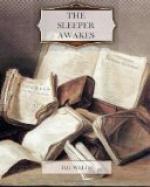The man dropped his hand and turned again. They went over the brow and to the headland beyond Penally, with the sleepless man gesticulating ever and again, and speaking fragmentary things concerning his whirling brain. At the headland they stood by the seat that looks into the dark mysteries of Blackapit, and then he sat down. Isbister had resumed his talk whenever the path had widened sufficiently for them to walk abreast. He was enlarging upon the complex difficulty of making Boscastle Harbour in bad weather, when suddenly and quite irrelevantly his companion interrupted him again.
“My head is not like what it was,” he said, gesticulating for want of expressive phrases. “It’s not like what it was. There is a sort of oppression, a weight. No—not drowsiness, would God it were! It is like a shadow, a deep shadow falling suddenly and swiftly across something busy. Spin, spin into the darkness. The tumult of thought, the confusion, the eddy and eddy. I can’t express it. I can hardly keep my mind on it—steadily enough to tell you.”
He stopped feebly.
“Don’t trouble, old chap,” said Isbister. “I think I can understand. At any rate, it don’t matter very much just at present about telling me, you know.”
The sleepless man thrust his knuckles into his eyes and rubbed them. Isbister talked for awhile while this rubbing continued, and then he had a fresh idea. “Come down to my room,” he said, “and try a pipe. I can show you some sketches of this Blackapit. If you’d care?”
The other rose obediently and followed him down the steep.
Several times Isbister heard him stumble as they came down, and his movements were slow and hesitating. “Come in with me,” said Isbister, “and try some cigarettes and the blessed gift of alcohol. If you take alcohol?”
The stranger hesitated at the garden gate. He seemed no longer aware of his actions. “I don’t drink,” he said slowly, coming up the garden path, and after a moment’s interval repeated absently, “No—I don’t drink. It goes round. Spin, it goes—spin—”
He stumbled at the doorstep and entered the room with the bearing of one who sees nothing.
Then he sat down heavily in the easy chair, seemed almost to fall into it. He leant forward with his brows on his hands and became motionless. Presently he made a faint sound in his throat.
Isbister moved about the room with the nervousness of an inexperienced host, making little remarks that scarcely required answering. He crossed the room to his portfolio, placed it on the table and noticed the mantel clock.
“I don’t know if you’d care to have supper with me,” he said with an unlighted cigarette in his hand—his mind troubled with ideas of a furtive administration of chloral. “Only cold mutton, you know, but passing sweet. Welsh. And a tart, I believe.” He repeated this after momentary silence.
The seated man made no answer. Isbister stopped, match in hand, regarding him.




